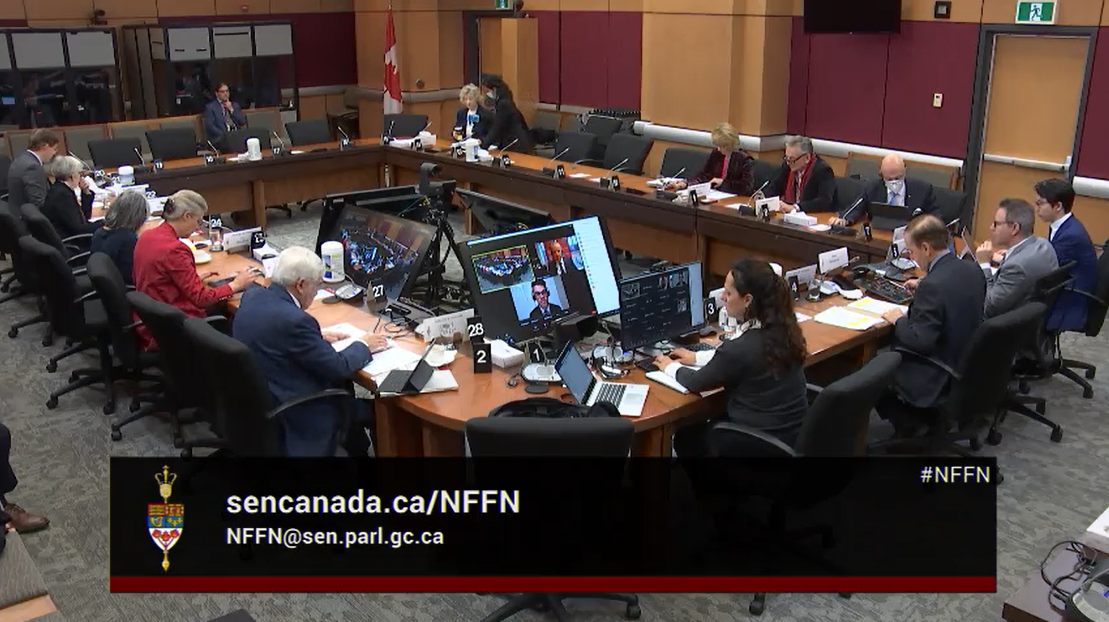Blog /
Canadian Chamber Addresses Bill C-32 Before Senate Committee
Canadian Chamber Addresses Bill C-32 Before Senate Committee
On November 29, 2022, we addressed Bill C-32, the bill implementing the Fall Economic Statement, before the Senate National Finance Committee.

In remarks to the Senate National Finance Committee on November 29, 2022, Canadian Chamber of Commerce Senior Director, Fiscal and Financial Services Policy, Alex Gray, commented on the bill implementing the Fall Economic Statement.
In his comments, Gray commended measures within Bill C-32, such as the Critical Minerals Exploration Tax Credit to help kickstart mining projects, increasing access to preferential tax rates for small business to remove an obstacle to growth, and incentivizing investments in air-source heat pumps.
Gray also highlighted important areas where Canada must do more to meet the moment. In an increasingly troubled world, he stressed that Canada has the potential to underwrite global economic security by delivering crucial goods the world urgently needs: food, fuel, and fertilizer.
To make progress in these areas, he advised Senators on three key items:
- Lower the cost of doing business in Canada by reducing the regulatory burden, avoiding new taxes, and eliminating interprovincial trade barriers.
- Reconsider regulations restricting the use of fertilizers and other crop inputs, which hold back our efforts to strengthen global food security.
- Recognize the important role Canadian energy plays in global markets to displace higher pollution sources from undemocratic countries.
Read and watch Gray’s full opening statement below.
Alex Gray’s opening statement
Check against delivery.
The Fall Economic Statement presented the government with an opportunity to lay out its vision for creating and sustaining the conditions necessary to grow our economy and raise future generations’ standard of living. Although we welcome the government’s commitment to fiscal prudence and its commitment to move towards a balanced budget, we see the lack of a decisive strategy to generate the investment required for strong, sustainable growth as a missed opportunity at a time when the world needs Canada as much as ever.
While we hold the view that the Fall Economic Statement essentially amounts to a placeholder for Budget 2023, the Canadian Chamber welcomed the announcement of measures to increase the supply of skills needed in our workforce to achieve net-zero as well as the commitment to reducing regulatory obstacles to investment in major projects. We eagerly await further details on these initiatives.
In the meantime, there are still commendable measures within Bill C-32. The Critical Minerals Exploration Tax Credit will help kickstart the mining projects which are essential to achieving a low-carbon future. Increasing access to the preferential tax rate for small businesses removes an obstacle to small business growth. And incentivizing investment in efficient air-source heat pumps – which can extract heat from air as cold as -30 degrees – seems like a smart Canadian solution.
Yet ultimately, these measures fall short of meeting the moment we find ourselves in today.
Geopolitical conditions are stark. Countries throughout the world are experiencing inflation not seen in a generation. The global economy will almost certainly stagnate or contract. Russia’s war against Ukraine is straining global supply chains. The world’s breadbasket no longer has safe access to international sea lanes, causing food shortages even for people far removed from the conflict.
Canada is not immune from these challenges, yet we are unique among free societies in our potential to underwrite global economic security through our natural resource inheritance: food, fuel, and fertilizer.
Canada now has an opportunity to show the world we can, quite literally, deliver the goods.
And indeed we must do more in this turbulent time. Deputy Prime Minister Freeland indicated as much at a recent speech in Washington, noting that Canada can reciprocate Europe’s generosity in honouring vaccine contracts by fast-tracking the energy and mining projects the world needs. The Canadian Chamber hopes the government will partner with business to create a clear and coherent strategy to meet the moment.
However, strategy without execution is pointless, and there are many obstacles for Canadian businesses to overcome.
First, we must lower the cost of doing business in Canada by reducing the regulatory burden, avoiding new taxes, and eliminating interprovincial trade barriers. In particular, we must reassess the manner in which we permit and approve major infrastructure projects.
We must also reconsider regulations restricting the use of fertilizers and other crop inputs, which hold back our efforts to strengthen global food security.
Let us also recognize the important role Canadian energy plays in global markets. Our energy projects can replace those in undemocratic nations while helping replace coal used to generate electricity – which benefits global security and serves as a bridge in our efforts to reach net-zero.
We had hoped that the Fall Economic Statement would contain several of these low- or no-cost growth measures. Canadian business is eager to partner with government to create a strategy to meet the moment. Given the headwinds we face, that is needed more than ever.
Other Blogs

Disclosing Episodic Disabilities in the Workplace

A Failure of Process and Policy: Canada’s Greenwashing Amendment to the Competition Act in Bill C-59





